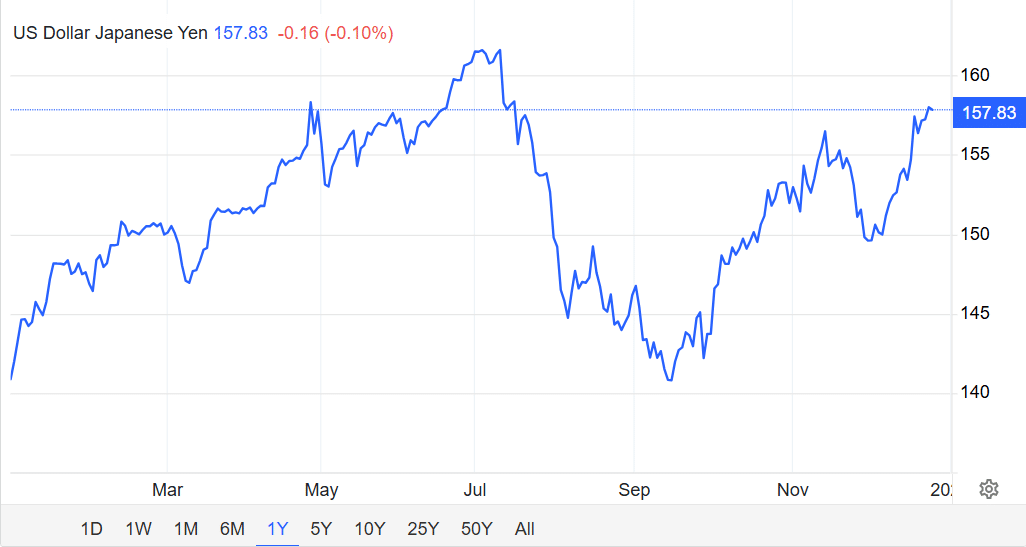- Bitcoin reserves have sparked intense controversy, with international locations deeply divided on their potential.
- As Japan faces mounting financial stress, might its struggles present the proper case research?
The controversy over Bitcoin [BTC] reserves is dividing the market. Some see it as an important hedge in opposition to the greenback’s volatility, whereas others stay deeply cautious, involved in regards to the speculative dangers tied to it.
The divide is so sharp that even the Fed and the Trump administration are at odds, every taking a starkly totally different stance on the difficulty.
Now, Japan is becoming a member of the dialog, elevating concerns in regards to the potential dangers of together with Bitcoin in its overseas reserves.
However right here’s the catch: The Japanese yen has hit a five-month low in opposition to the U.S. greenback, becoming a member of a rising record of G20 currencies struggling to maintain up with the greenback’s dominance.
So, will Japan’s cautious strategy to Bitcoin reserves be seen as a missed alternative? Or will this financial stress push Japan – and different nations – to lastly acknowledge BTC as a severe various?
Unraveling Japan’s financial storm in 2025
The current FOMC price minimize triggered a ripple impact throughout markets, sparking an ‘surprising’ twist.
On the 18th of December, because the Fed’s choice made headlines, the U.S. greenback index surged to a staggering two-year excessive of 108.54.
The fallout was fast and brutal. Bitcoin plunged 14% in simply three days, whereas world currencies crumbled beneath the stress. The Japanese yen wasn’t spared, plunging to a five-month low of 158 per greenback.
In rapid response, the Financial institution of Japan (BOJ) held its floor, holding rates of interest regular. However the true storm could also be forward.
The long-term influence of a surging greenback may very well be far-reaching, with inflationary pressures set to climb.
The indicators are already right here. Japan’s annual inflation rate spiked to 2.9% in November 2024, up from 2.3% the earlier month, marking its highest studying since October 2023 – and it’s greater than only a quantity on a chart.
This inflation surge is a transparent sign of what’s to come back. Rising inflation, coupled with the robust greenback, is placing Japan in a troublesome spot. Imports are rising dearer, squeezing each companies and customers.
All of that is unfolding in opposition to the backdrop of Japan’s demographic disaster – an getting older inhabitants and declining delivery charges.
This shift is weakening the labor power, making the challenges of 2025 much more daunting.
So, are Bitcoin reserves the fitting answer?
The reply isn’t clear-cut – it’s each a ‘sure’ and a ‘no’. On one hand, Bitcoin’s restricted provide makes it a powerful hedge in opposition to rising inflation.
Not like the U.S. greenback, which might be printed at will, Bitcoin’s capped provide affords Japan and different economies a safeguard in opposition to forex devaluation.
Nonetheless, there’s a big draw back. Bitcoin’s value might be extremely unstable, making it a dangerous asset for a rustic like Japan, which values stability above all.
That mentioned, with Japan’s financial system dealing with growing pressure, the thought of embracing Bitcoin reserves will not be as far-fetched because it as soon as appeared. In truth, it might quickly develop into a necessity for financial resilience.
And this shift isn’t nearly nationwide economies. On a smaller scale, main exchanges are additionally stacking Bitcoin. As an illustration, Bitfinex’s Bitcoin reserve just lately hit over $230 million, a stage final seen three years in the past.
As extra international locations eye Bitcoin as a ‘security web’ in opposition to the rising volatility of world markets, excessive liquidity is predicted to flood the market, with exchanges readying for elevated demand.
Learn Bitcoin’s [BTC] Price Prediction 2025-26
So, whereas the U.S. greenback continues to dominate, many economies are looking for alternate options. Bitcoin may very well be the reply, however provided that its value stabilizes within the 12 months forward.
If it does, the opportunity of utilizing Bitcoin as a hedge and even a mode of cost might not be a distant dream.





























